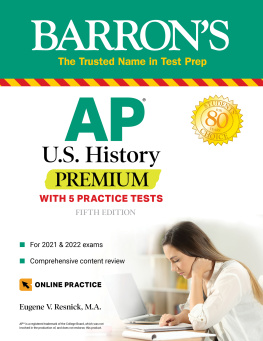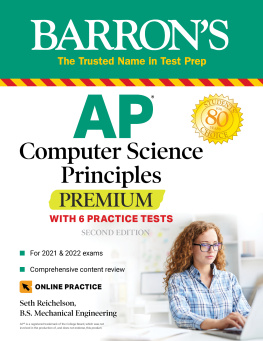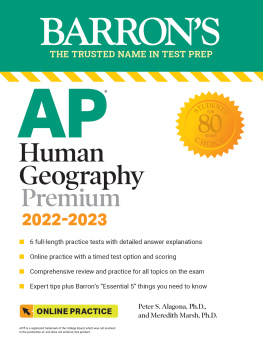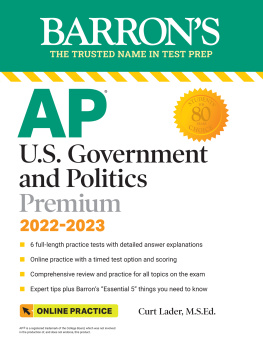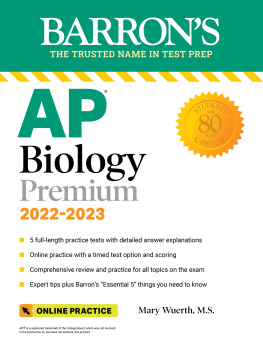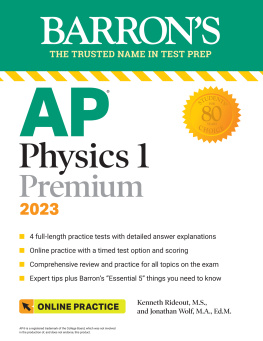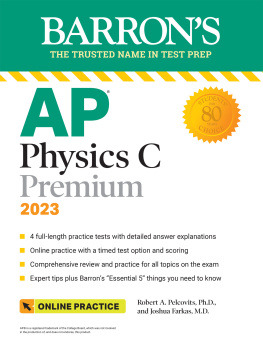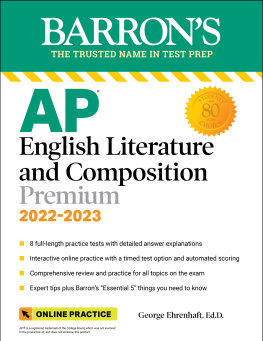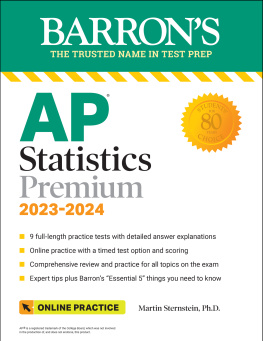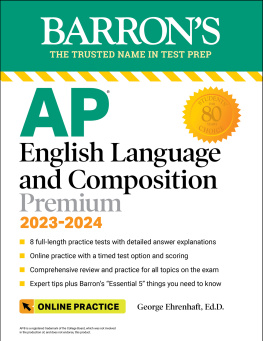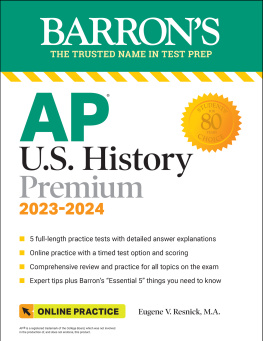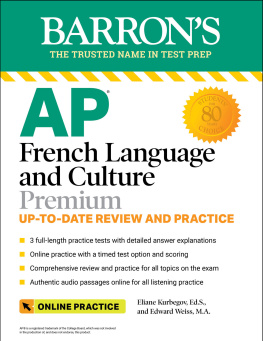BARRONS
THE TRUSTED NAME IN TEST PREP
AP
Psychology
Premium
2022-2023
Allyson J. Weseley, Ed.D.
and Robert McEntarffer, Ph.D.
AP is a registered trademark of the College Board, which was not involved in the production of, and does not endorse, this product.
To Kristin, Esme, and Guy.R.M.
To Sara, Kate, and EIi.A.W.
Copyright 2022, 2020, 2018, 2016, 2014, 2012, 2010, 2007, 2004, 2000 by Kaplan, Inc., d/b/a Barrons Educational Series
All rights reserved under International and Pan-American Copyright Conventions. By payment of the required fees, you have been granted the non-exclusive, non-transferable right to access and read the text of this eBook on screen. No part of this text may be reproduced, transmitted, downloaded, decompiled, reverse engineered, or stored in or introduced into any information storage and retrieval system, in any form or by any means, whether electronic or mechanical, now known or hereinafter invented, without the express written permission of the publisher.
Published by Kaplan, Inc., d/b/a Barrons Educational Series
1515 West Cypress Creek Road
Fort Lauderdale, FL 33309
www.barronseduc.com
ISBN: 978-1-5062-7852-0
10 9 8 7 6 5 4 3 2 1
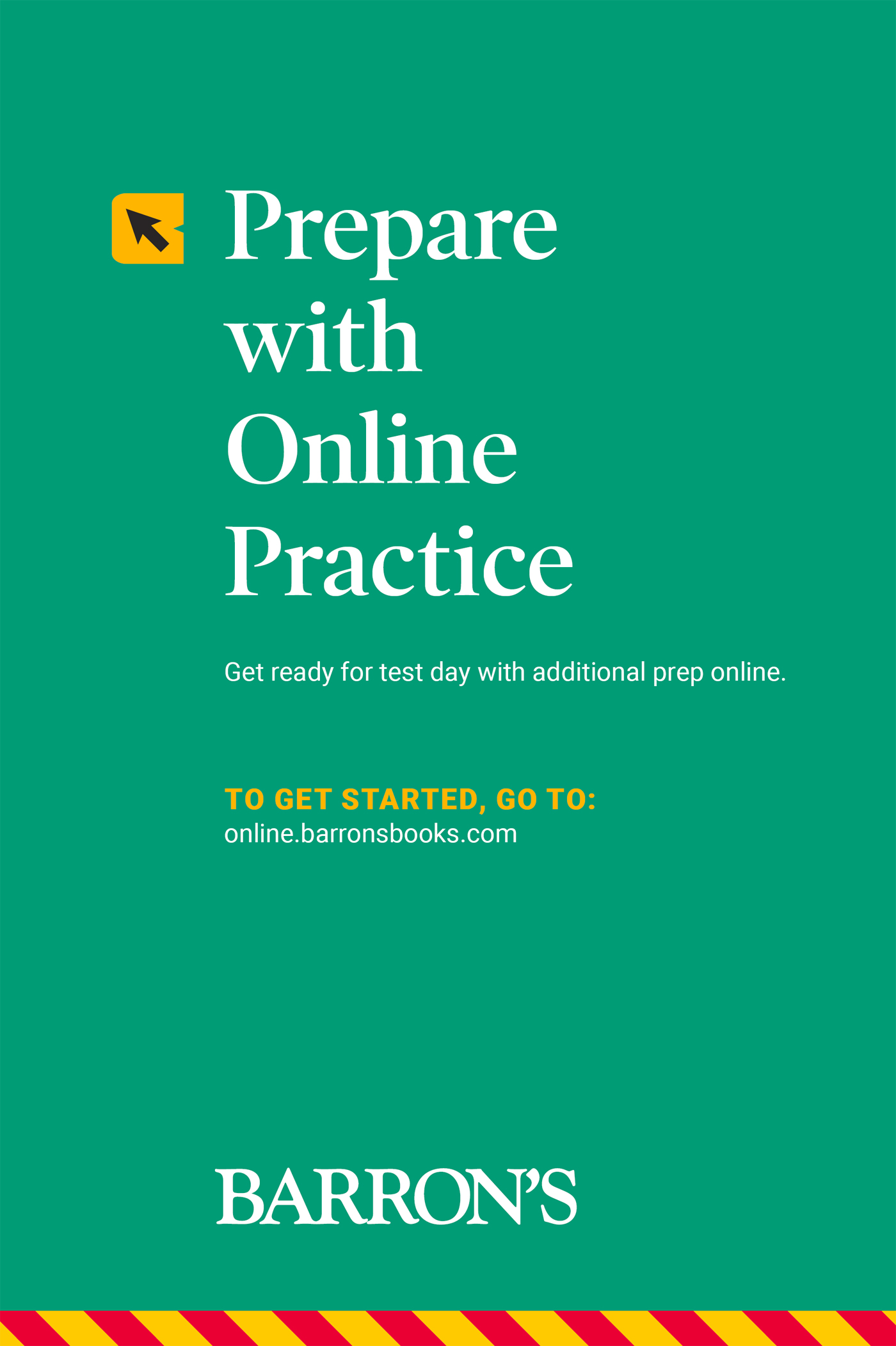
About the Authors
Rob McEntarffer taught AP Psychology at Lincoln Southeast High School in Lincoln, NE, for 13 years and Psychology at Nebraska Wesleyan University for 7 years. He earned his teaching certificate in psychology from the University of Nebraska, a masters degree in educational psychology, and a Ph.D. in education. He has extensive experience in scoring the Advanced Placement Psychology free-response questions, having served as a Reader and Table Leader, and as the high school Question Leader. He is past chair of the national organization Teachers of Psychology in Secondary Schools, worked with the committee on the National Standards for the Teaching of High School Psychology, and is involved in writing assessment materials for high school- and college-level introductory psychology textbooks. He works as an assessment specialist for his school district.
Allyson Weseley has taught AP Psychology and run a Behavioral Science Research Program at Roslyn High School in Roslyn Heights, NY, for over 25 years. Her students have enjoyed great success on the AP exam, with a 100 percent passing rate and well over 80 percent earning 5s. She earned an undergraduate degree in psychology from Princeton University, a masters degree from the Harvard Graduate School of Education, and a doctorate from Columbia Universitys Teachers College. Dr. Weseley has served as a Reader and Table Leader for the AP Psychology exam, published a number of psychology-related activities, led several psychology teacher workshops, and served on the board of Teachers of Psychology in Secondary Schools.
How To Use This Book
The purpose of this book is to provide you with the best possible preparation for the AP Psychology exam. Using the tools included in this book will help you prepare for success on exam day.
Diagnostic Test
A diagnostic test is included to help you gauge how best to prepare for the exam. You may wish to take this test after you have been exposed to all the information provided by your class but before you begin to study. The Multiple-Choice Error Analysis Sheet is intended to help you identify your areas of relative strength and weakness. Notice that the Multiple-Choice Error Analysis Sheet is organized according to the chapter titles you can find in the textbook you used in your AP Psychology class. This should help you use information from the diagnostic test to determine what chapters to review in the textbook. For each of the 14 chapters, compute the percentage of questions you answered correctly. In this test, the number of questions on a topic is indicative of the amount of attention the topic typically receives on the exam. Therefore, you should spend the most time studying the areas on which many questions were asked and you got a relatively low percentage of them correct.
Review and Practice
This review is organized in nine units that are comprised of 14 chapters. The College Board recently revised the way they organized materials for the AP Psychology course. The textbook you use for your AP Psychology course probably includes about 14 chapters. The College Board grouped these chapters into nine overall units.
Multiple-choice practice questions and explanations of the correct answers are provided at the end of each review chapter. We recommend that you first review the material in the chapter and then answer all the review questions in order to test your comprehension.
Because this is a review book, our aim is to include only that information you need to know for the exam. Nonetheless, some of this information is particularly important, and we convey that fact by highlighting such material as Tips. Important terms and people appear at the beginning of each chapter and are set in bold in the text. They can also be found in the index.
To help you prepare for the exam, focuses on how to answer the free-response questions. We included a discussion of how best to approach the essays and also provide a number of examples of the kinds of essay questions likely to appear on the exam. We also include model essay answers to give you an idea of what the readers of the exam are looking for.
Practice Tests
At the end of the book we included two full-length practice exams. Keep in mind that taking a practice exam under actual testing conditions (all at once and within the time limit) is always best. Every exam includes an explanation of the correct answers as well as an Error Analysis Sheet.
Online Practice
In addition to the diagnostic test and two practice tests within this book, there are also three full-length online practice exams. You may take these exams in practice (untimed) mode or in timed mode. All questions include answer explanations.
For Students
The organization of this book should closely match the textbook you use in your classroom. How you use the book depends on how your school offers the course. Nevertheless, by answering the review questions at the end of each chapter and by taking the practice tests, you will have an indication of how well you will do on the actual exam.
For Teachers
Suggest to your students that they use this book along with their textbook. If you develop your own assignments and tests around the course framework, this book should offer your students the opportunity to use the material for review.
BARRONS ESSENTIAL 5
As you review the content in this book to work toward earning that on your AP PSYCHOLOGY exam, here are five things that you MUST know above everything else:
Know the psychological perspectives. Psychological researchers study the mind and behavior from different perspectives. Each perspective uses some unique research methods, concepts, and vocabulary to describe and explain thinking and behavior. Knowing the vocabulary and concepts associated with each perspective can help you better understand psychological theories and quickly narrow down possible answers to exam questions. For instance, if a question uses the term classical conditioning, you should be able to immediately identify the question as belonging in the behavioral area of psychology and look for answers that include other behavioral terms or key individuals. The psychological perspectives are introduced in and form the basis for the discussion of personality, psychological disorders, and treatment of psychological disorders found in Chapters 11, 12, and 13, respectively.
Next page

